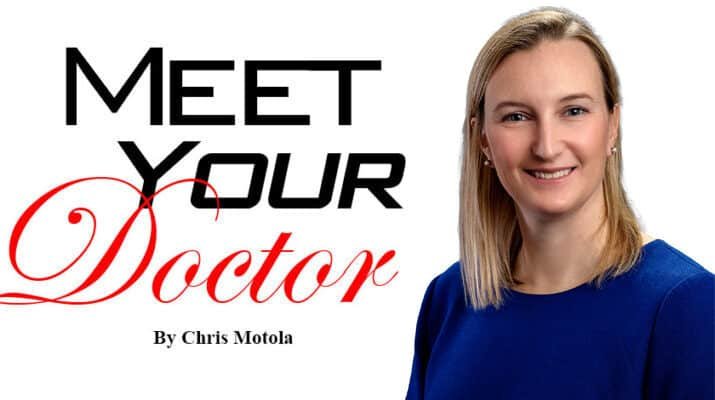St. Joe’s primary care physician: To successfully treat patients ‘you really have to take into account the whole person’
Q: How did you come to practice at St. Joseph’s Physicians Primary Care?
A: We moved up here about two and a half years ago. I went to school in Colgate and we have some friends from the area, two from medical school. So we were interested in Syracuse for a while. I grew up in Connecticut. I worked somewhere else before St. Joe’s and decided it wasn’t a great fit. I started here about a year and a half ago, and it’s been great. I love the community, my partners here are great. It’s a very supportive, collegial group. I like that they really do practice family medicine, so we see all ages. And the practice has been around so long and is so well-established. That was a big draw.
Q: What does your patient population look like?
A: We’re mostly adults, but I do love working with children. I’m trying to build up my pediatric practice. We have a lot of geriatric patients just with the aging population. But I inherited patient panels from two doctors who had recently retired. So a lot of older patients, but I’m trying to increase those pediatric numbers.
Q: What traits do you think are more important in a primary care physician?
A: I think you really have to take into account the whole person. Otherwise you’re not going to make that much progress with them. So I try to focus on prevention and educating patients about wellness and diet. And then managing chronic diseases, trying to figure out what works for you to help you get better. Not just be like, “Oh, you have to take this medicine.” It’s figuring out what aspects of your life are affecting your wellness and how can we work on those to help you live your best life.
Q: In terms of preventive care, people seem to have a pretty good idea of what they need to do in broad strokes, but actualizing that information is often challenging. How do you help people get around those stumbling blocks?
A: That’s a good question. With diet, I think doctors and society at large could do a much better job of educating kids about diet and healthy choices and what an impact it has on your health. Even in medical school we didn’t really have that much nutritional training and I wish we’d focused more on that in our educational system. So I try to focus on basic principles of nutrition and how that affects health.
Q: What areas of nutrition do you think most people tend to be weak on?
A: There’s just so much unhealthy food available to everyone and portions are just so enormous. So educating people on proper portion sizes is important. I try to take a practical approach of talking about your average dinner plate and talking about how much each portion should be on the dinner plate. Michael Pollan’s, who’s a well-known nutrition writer, I believe said, “Eat food, not too much and mostly plants.”
So I try to tell that to people. Getting very specific and trying to get people to limit themselves significantly is not really a recipe for success. It’s not sustainable. So trying to impress the basic principle of “don’t overdo it, try to eat vegetables, but if you have a craving for something go for it.” So I try to counsel with reasonable expectations in mind with regard to what you can actually do, and not feel too guilty about eating something unhealthy.
Q: You did your medical schooling in Grenada. What was that experience like?
A: It was an interesting experience, because it’s a third world country. It was certainly a lesson in humility because we were very much guests in their community and their culture. It was humbling to live outside of the United States, live in that culture and adapt. In Grenada, and a lot of other Caribbean countries, you don’t have everything available all the time, which we’re not really used to in the United States. So learning to make due with what you have is an important lesson I learned down there. And also, it’s an incredibly beautiful place with wonderful people. It was fun to get outside of our comfort zone and meet people I otherwise wouldn’t have had the opportunity to meet.
Q: You’re a generalist, of course, but are there any types of cases you find particularly interesting?
A: Yeah, I love pediatrics. I have two little kids myself. So I love seeing kids. I love women’s health. I do a lot of routine pap smears and management of routine women’s health issues. Sports medicine is an interest too. I was an athlete. I enjoy seeing the aches and pains.
Q: What are the most common sports-related injuries you see?
A: The most common pain-related thing we see is back pain, but that’s generally not sports-related. That’s just kind of wear-and-tear age-related. But we do see a lot of activity-related injuries to the knees and shoulders. Those are the most common.
Lifelines
Name: Abigail Tillman, M.D.
Position: Primary care physician at St. Joseph’s Physicians Primary C
Hometown: Greenwich, Conecticut
Education: Earned her Doctor of Medicine from St. George’s University in Grenada, West Indies, and her bachelor’s degree from Colgate University. In 2017, completed her residency at Middlesex Hospital, a member of the Mayo Clinic Care Network, in Middletown, Connecticut
Career: Provided inpatient and outpatient care at St. Francis Hospital and Medical Center, a member of Trinity Health of New England, in West Hartford, Masschusetts
Affiliations: St. Joseph’s Hospital Health Center
Organizations: Certified by the American Board of Family Medicine, member of the American Academy
of Family Physicians, Wilderness
Medical Society
Family: Husband, two children
Hobbies: Skiing

